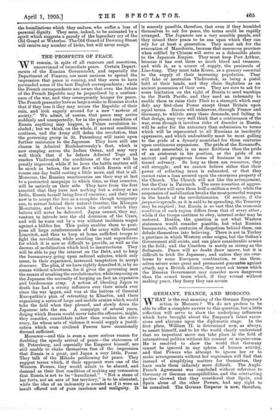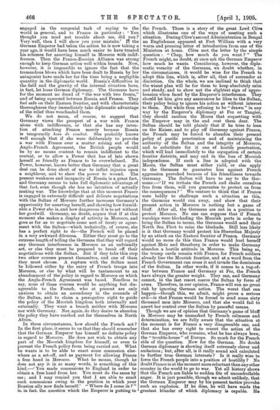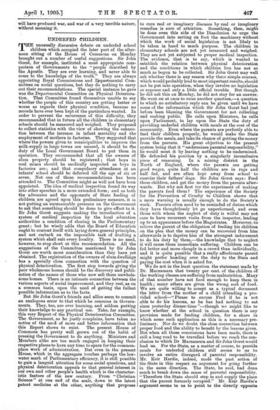GERMANY, FRANCE, AND MOROCCO.
WHAT is the real meaning of the German Emperor's action in Morocco ? We do not profess to be able to offer a complete answer to this question, but a little reflection will serve to show the underlying influences which have brought about the Emperor's latest excur- sions and alarums upon the diplomatic stage. In the first place, William II. is determined now, as always, to assert himself, and to let the world clearly understand that no important move can take place in the field of international politics without his consent or acquiescence. He is resolved to show the world that Germany cannot be ignored in any sphere of human activity, and that Powers who attempt to ignore her or to make arrangements without her cognisance will find that instead of simplifying, matters for themselves," they have made them infinitely more difficult. The Anglo- French Agreement was concluded without reference to Germany or German susceptibilities, and the cOntracting parties showed that they considered that Spain, and Spain alone of the other Powers, had any right to he consulted. The German Emperor is now, therefore, engaged in the congenial task of saying to the world in. general, and to France in particular : You thought you need not trouble about me, did you ? Very. well, then I will show you your mistake.' n the German Emperor had taken the action he is now taking a year ago, it would have been much easier to have treated, his schemes for, asserting himself in Morocco with indif- ference. Then the Franco-Russian Alliance was strong enough to keep German action well within bounds. Now, however, it is impossible to ignore the fact that the tremendous blows which have been dealt to Russia by her antagonist have made her for the time being a negligible quantity in the diplomatic world. Russia's difficulties in the field and the gravity of the internal situation have, in fact, let loose German diplomacy. The Germans have for the moment no dread of "the war with two fronts," and of being squeezed between Russia and France. They feel safe on their Eastern frontier, and with characteristic thoroughness they immediately take diplomatic advantage of the relief thus vouchsafed them.
We, do not mean, of course, to suggest that Germany views the prospect of a war with France alone with indifference, or that she has any inten- tion of attacking France merely because Russia is temporarily hors de contbat. She probably knows well enough that if she were deliberately to provoke a, war with France over a matter arising out of the Anglo-French Agreement, the British people would be by no means content to remain indifferent to the contest, or to allow a, Power that has of late shown herself so friendly as France to be overwhelmed. No Power, however, knows better than Germany that a great deal can be done short of wax to inflict injuries upon a neighb,our, and to show the power to wound. The present weakness and incapacity of Russia is a great fact, and Germany, means to take full diplomatic advantage of that fact, even though she has no intention of actually making war. The knowledge that at this moment France is engaged in extremely difficult and. delicate negotiations with the Sultan of Morocco further increases Germany's opportunity, for asserting herself, and showing how formid- able a Power she is, and how dangerous it is to act without her goodwill. Germany, no doubt, argues that if at this moment she, makes a display of activity in Morocco, and. goes so far, as to negotiate some sort of treaty or agree- ment with the Sultan—which technically, of course, she has a perfect right to do—the French will be placed in a very awkward dilemma. Either they must go to the extreme length of telling the Germans that they will regard any German interference in Morocco as an unfriendly act, or else they must be prepared to break off their negotiations with the Sultan. But if they take this step two other courses present themselves, and one of them they must choose. A rupture with the Sultan must be followed either by the entry of French troops into Morocco, or else by what will be tantamount to an abandonment of the policy in regard to Morocco on which the Anglo-French Agreement was based. Needless to say, none of these courses would be anything but dis- agreeable to the French, who at present are only anxious to obtain an ascendency in the counsels of the Sultan, and. to claim a prerogative right to guide the policy of the Moorish kingdom both internally and externally. They want a breach neither with Morocco nor with Germany. Nor, again, do they desire to abandon the policy they have marked out for themselves in North Africa.
In these circumstances, how should the French act ? In the first place, it seems to us that they should remember that the German Emperor has himself no definite policy in regard to Morocco. He does not wish to obtain any part of the Moorish kingdom for himself, or even to prevent the French policy from being carried out. What he wants is to be able to exact some concession else- where as a set-off, and as payment for allowing France a free hand in Morocco. What he means, though he does not say it in so many words, is something of this kind :—' You made concessions to England in order to obtain a, free hand from her. You,must do the same by me ; and I may remind. you that I am able to exact such concessions owing to the position in which your Russian ally new finds herself.' "Where do I come is, in fact, the question which the Emperor is putting to the French. There is a story of the great Lord Clive which illustrates one of the ways of meeting such a situation. Daring Olive's second. Administration in Bengal an Englishman appeared at Fort William with a very warm and pressing letter of introduction from one of the Ministers at home. Clive met the letter by the simple question : "Chap, how much do you want ? " The French might, no doubt, at once ask the German Emperor how much he wants. Considering, however, the diplo- matic voracity of the Germans, we doubt whether, in the circumstances, it would be wise for the French to adopt this line, which is, after all, that of surrender at discretion. On the whole, we are inclined to think that the wisest plan will be for them to keep absolutely calm and steady, and to show not the slightest sign of appre- hension when faced by the Emperor's interference. They should let him give any assurances he likes to the Sultan, their policy being to ignore his action as without interest to them. But while thus refusing to be " drawn " in any way by the Emperor's diplomacy at Fez or Tangier, they should. caution the Moors that coquetting with the Emperor may in the end cost them dear. The Sultan should be told plainly that if he tries to lean on the Kaiser, and to play off Germany against France, the French may be forced to abandon their present policy of pacific penetration and of maintaining the authority of the Sultan and the integrity of Morocco, and to substitute for it one of hostile penetration, which will lead immediately to the occupation of certain frontier districts, and may end in the loss of Moorish independence. If such a line is adopted with the Moors, the Sultan must either yield, or else apply to the Germans to guarantee him against French aggression provoked because of his friendliness towards Germany. The Sultan will have to say to the Ger- mans If we irritate the French and shake ourselves free from them, will you guarantee to protect us fron. the consequences ? ' We venture to think that if France were boldly to challenge such a situation as this, the Germans would run away, and show that their present action in Morocco is nothing but a game of bluff. After all, the Germans are not in a position to protect Morocco. No one can suppose that if French warships were blockading the Moorish ports in order to bring the Sultan to terms, the Germans would send their North Sea Fleet to raise the blockade. Still less likely is it that Germany would protect his Shereefian Majesty by an attack on the Eastern frontier of France. Germany would no more do this than France would hurl herself against Metz and Strasburg in order to make Germany abandon a hostile attitude in Morocco. This being so, the trump cards remain with France, for French soldiers already line the Moorish frontier, and. at a word from the French Government can cross it and invade the dominions of the Sultan. In other words, if it comes to a tug-of- war between France and Germany at Fez, the French have always the greater weight. They can, and Germany cannot, in the last resort coerce the Sultan by force of arms. Therefore, in our opinion, France will run no great risk by ignoring German action. The worst that can happen—though this, we admit, might prove a serious evil—is that France would. be forced to send some sixty thousand men into Morocco, and that she would fail to assert her control over the Sultan by peaceful means.
Though we are of opinion that Germany's game of bluff in Morocco may be unmasked by French calmness and determination, we are fully aware that the situation at the moment is for France a very disagreeable one, and that she has every right to resent the action of the German Emperor, who remains, what he has always been, the " trouble-house " of Europe. So much for the French side of the question. Now for the German. No doubt German diplomacy is showing itself extremely clever and audacious ; but, after all, is it really sound and calculated to further true German interests ? Is it really wise to force the French people into a position of hostility ? No doubt France is at the moment more reluctant than anyother country in the world to go to war. Yet all history shows that the French are liable to sudden fits of uncontrollable anger. It is just possible, though we admit unlikely, that the German Emperor may by his present tactics-provoke such an explosion. If he does, he will have made the greatest blunder of which diplomacy is capable. He will have produced. war, and war of a very terrible nature, without meaning it.








































 Previous page
Previous page